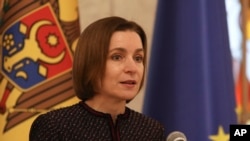Moldovan President Maia Sandu hailed the adoption by parliament Saturday of a new defense strategy — calling for anchoring Moldova alongside its Western allies — and identifying Russia as a threat to the former Soviet state.
Sandu posted on Facebook two days after the European Union agreed to open talks on extending its membership with both Moldova and neighboring Ukraine — more than 21 months into Moscow's invasion of Ukraine.
Sandu has denounced Russia's invasion of Ukraine and accused Moscow of plotting a coup to oust her. She said the new security strategy outlined the "main threats" facing Moldova and how to "effectively counter" them. "There are two principal threats to our national security — the aggressive policy of the Russian Federation against our country as a whole and deep-rooted corruption in Moldova," she wrote.
Members of Sandu's Party of Action and Solidarity hold a majority in Moldova's parliament, which on Friday adopted the strategy focusing on closer ties with the EU, Romania, the United States and NATO.
But Moldova is to retain the "neutral" status set down in its constitution and, unlike Ukraine, is not seeking NATO membership.
The document said the new strategy was "vital in the current geopolitical context to limit the risks facing Moldova."
"It is clear that the Russian Federation in the near future will not abandon its hostile actions against Moldova," the document read. "We must therefore learn to live in conditions of a protracted, high-intensity hybrid war."
Russian Foreign Ministry spokesperson Maria Zakharova denounced the document as "Russophobic," saying Moscow had always respected Moldova's interests.
Kremlin spokesperson Dmitry Peskov derided the EU's decision to launch membership talks with Ukraine and Moldova, saying neither country met the bloc's criteria for membership.
The Moldovan Foreign Ministry's press secretary, Igor Zaharov, said Peskov's comments were a clear indication that Moldova was drawing clear of Moscow's sphere of influence.
"We are decisively moving along the European path," Zaharov told Radio Moldova. "This naturally makes the Russian political class unhappy or even indignant, but we have chosen this path and ask outside forces to stay out of our internal decisions."





